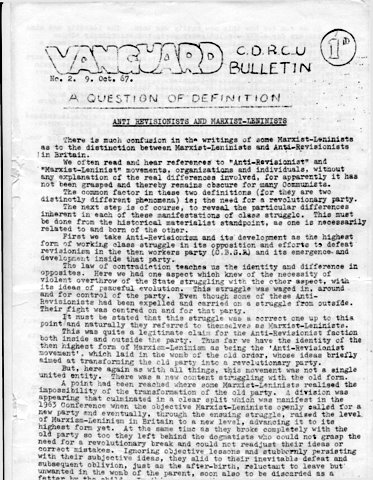
First Published: C.D.R.C.U. Bulletin, No. 2, October 9, 1968
Transcription, Editing and Markup: Paul Saba
Copyright: This work is in the Public Domain under the Creative Commons Common Deed. You can freely copy, distribute and display this work; as well as make derivative and commercial works. Please credit the Encyclopedia of Anti-Revisionism On-Line as your source, include the url to this work, and note any of the transcribers, editors & proofreaders above.
There is much confusion in the writings of some Marxist-Leninists as to the distinction between Marxist-Leninists and Anti-Revisionists in Britain.
We often read and hear references to “Anti-Revisionist” and “Marxist-Leninist” movements, organizations and individuals, without any explanation of the real differences involved, for apparently it has not been grasped and thereby remains obscure for many Communists.
The common factor in these two definitions (for they are two distinctly different phenomena) is the need for a revolutionary party.
The next step is of course, to reveal, the particular differences inherent in each of these manifestations of class struggle. This must be done from the historical materialist standpoint, as one is necessarily related to and born of the other.
First we take Anti-Revisionism and its development as the highest form of working class struggle in its opposition and efforts to defeat revisionism in the then workers’ party (CPGB) and its emergence and development inside that party.
The law of contradiction teaches us the identity and difference in opposites. Here we had one aspect which knew of the necessity of violent overthrow of the State struggling with the other aspect, with its ideas of peaceful evolution. This struggle was waged in, around and for control of the party. Even though some of these Anti-Revisionists had been expelled and carried on a struggle from outside. Their fight was centred on and for that party.
It must be stated that this struggle was a correct one up to this point and naturally they referred to themselves as Marxist-Leninists.
This was quite a legitimate claim for the Anti-Revisionist faction both inside and outside the party. Thus far we have the identity of the then highest form of Marxism-Leninism as being the ’Anti-Revisionist movement’, which laid in the womb of the old order, whose ideas briefly aimed at transforming the old party into a revolutionary party.
But, here again as with all things, this movement was not a single united entity. There was a new content struggling with the old form.
A point had been reached where some Marxist-Leninists realised the impossibility of the transformation of the old party. A division was appearing that culminated in a clear split which was manifest in the 1963 Conference when the objective Marxist-Leninists openly called for a new party end eventually, through the ensuing struggle, raised the level of Marxism-Leninism in Britain to a new level, advancing it to its highest form yet. At the same time as they broke completely with the old party so too they left behind the dogmatists who could not grasp the need for a revolutionary break and could not readjust their ideas or correct mistakes. Ignoring objective lessons and stubbornly persisting with their subjective ideas, they slid to their inevitable defeat and subsequent oblivion, just as the after-birth, reluctant to leave but unwanted in the womb of the parent, soon also to be discarded as a fetter by the child. In this process they forfeited all title to Marxism-Leninism, for Marxism-Leninism moved on, but historically speaking, the identity they still retain is that of ’Anti-Revisionists’.
Anti-revisionism has been a historical stage in the development of Marxism-Leninism in Britain and from it we learn much. Anti-revisionists there are still. Some are comrades objectively treading the same path as those before them on the road to Marxism-Leninism.
So we can see how this new entity was born. The identity and aims of which are for a NEW revolutionary party and accordingly, those Communists who right up to the present moment call openly for such a party can legitimately lay claim to being Marxist-Leninists.
But, watch closely, other changes have since taken place with more to come; new divisions have appeared. Marxism-Leninism will yet again rise to a higher form in Britain, leaving behind those who really have nothing in common with Marxism-Leninism.
In conclusion it should be recognised that:
A. The correct definition of an Anti-Revisionist is clearly a ‘Transformist’, as one who has not yet broken with the old form of struggle or old party.
B. It should be defined that a Marxist-Leninist is one who is engaged in a movement of the highest development of class consciousness. As being a Communist who is calling at this moment for a NEW revolutionary party, based on the recognition of the need for the forcible overthrow of the State by the working class and its allies led by such a party of the working class.